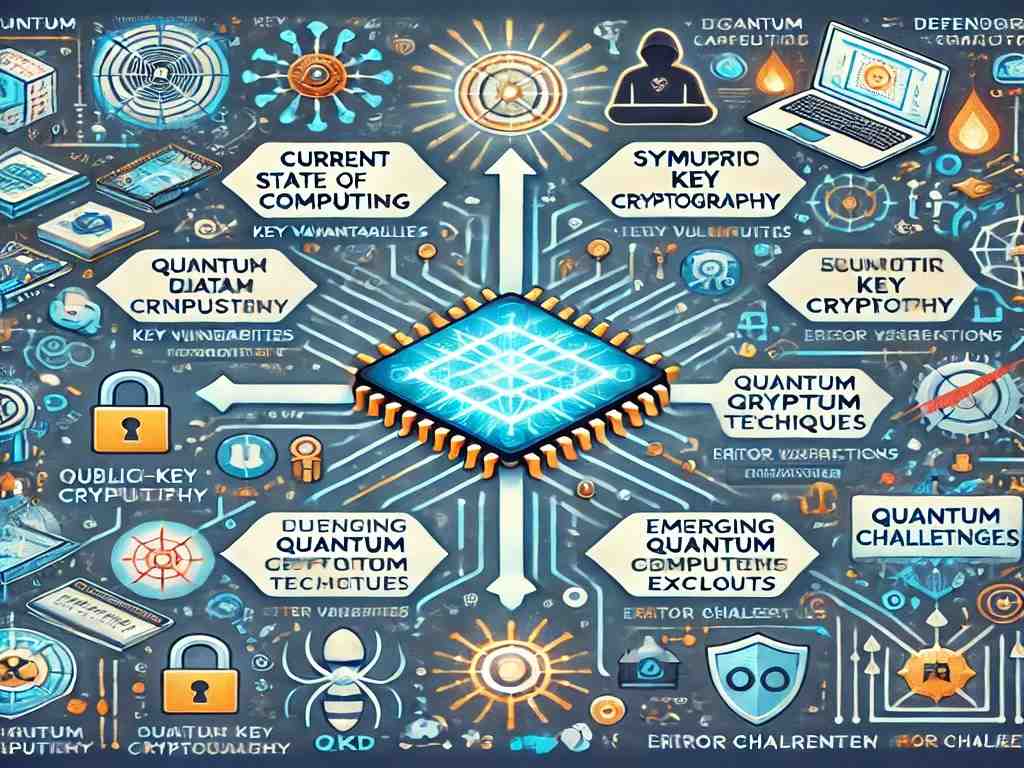Covered Contents
ToggleIntroduction
Quantum computing is pitched as an innovation where the very areas of healthcare, finance, and AI can change, at best, by order of magnitude and, worst case, without bounds. The situation is reminiscent of opening Pandora’s Box-innovative capacity at one pole and unknown perils at the other. One area most often named at the frontlines is cybersecurity; with quantum computing possibly unlocking an avenue to the greatest cyber-attack ever on information confidentiality. The upcoming article will be written on this topic of threats, possible approaches to quantum hacking, and various challenges for a defender and an attacker in a post-quantum environment.
The Current State of Quantum Computing
Quantum computing is still a new field, but in the last decade, it has developed rapidly.
Quantum Supremacy:
In 2019, Google claimed to have achieved “quantum supremacy,” meaning that it solved a problem that would take regular supercomputers thousands of years. Still, quantum computers are not powerful enough to crack most modern encryption.
Quantum Hardware:
IBM, Google, and Intel, among others, are building quantum computers based on technologies such as superconducting qubits. However, these systems are yet to be scaled up.
Quantum Software:
New quantum algorithms under development promise a much faster solving of problems than the classical algorithms. However, developing error-resistant algorithms that can be run on large-scale quantum computers remains in the process.
The potential is massive, despite the challenges. Quantum computing might break all the encryption methods used to secure everything from your email to the transactions in the banks. Knowing such risks will prepare one for the future when quantum computing becomes a mainstream tool.
Key vulnerabilities: the future of quantum computing
Quantum computing is a huge leap forward in computation, but this leap forward comes with a critical vulnerability-the ability to break current encryption systems.
1. Vulnerability of Public-Key Cryptography
Public-key cryptography is the basis for current encryption systems like RSA, ECC, etc. These enable the safe and secure communication of two parties over large prime numbers that are almost impossible to factor in using traditional computers. Shor’s Algorithm is a quantum algorithm that factors large numbers exponentially much faster than a classical algorithm. That would imply, for example, that RSA and ECC will be readily broken in the presence of a sufficiently powerful quantum computer. All encrypted data will be compromised.
2. Symmetric Key Cryptography
In symmetric key cryptography, the encryption methods, such as AES are much harder to crack but are not secure after all. These could, in theory, be broken by quantum computers too, but more sophisticated quantum algorithms than those are required, like Grover’s Algorithm. Grover’s Algorithm searches through an unsorted database quadratically faster than the best classical computer. Brute force attacks on symmetric encryption keys will become much easier to perform than with classical computers, and so quantum computing could drive down the size of the key needed to maintain a similar level of security.
3. Digital Signatures
The second area in peril is the digital signature. This is used to authenticate the authenticity of data or transactions. Since quantum computers are capable of effectively solving many of the mathematical problems underpinning most digital signature schemes-very notably blockchain technologies create a huge threat to the security and integrity of such systems.
Emerging Quantum Hacking Techniques
As quantum computing progresses, new methods for quantum-specific hacking will probably emerge. There are some of the possibilities hackers might present in the future:
1. Quantum hacking is possible by way of QKD.
QKD is an approach based on quantum mechanics in that it aims at securing the channel of communication. It thus presents a two-way channel whereby parties can be guaranteed of cryptographic key exchange where all forms of eavesdropping are picked. However, hackers can exploit such weaknesses that exist in the QKD process, especially using what may be termed as advanced quantum attacks involving alteration of the quantum state of a communication channel.
2. Quantum Cryptanalysis
Quantum computers will be able to execute cryptanalysis at a scale that has never occurred before. Hackers will break encryption keys using quantum algorithms, decrypt private messages, and expose sensitive information. This method of quantum cryptanalysis will become the most powerful tool in the hacker’s arsenal once a quantum computer is scaled to a size that allows it.
3. Quantum Data Harvesting
Today, the harvested data could be the future goldmine with quantum computing. Hackers may start harvesting encrypted data, caching it, and then decrypt once the quantum computer matures to break the common encryption systems. This is one of the biggest methods associated with “quantum data harvesting,” which would mean long-term privacy for data would be at risk.
Troubles for the Quantum Hacker
Despite the enormous power offered by quantum computing, quantum hackers will have to face several challenges before they fully unleash their potential. Some of them include the following:
1. Hardware Limitations
In its present form, even quantum computers are highly susceptible to the environment under which they function. Quantum hacking requires extremely low temperatures and special apparatuses. The technique of quantum hacking is highly resource-intensive. Until such a time as high-power quantum computers can be commercially distributed, hackers are unlikely to apply the full spectrum of quantum hacking techniques with complete confidence.
2. Error Correction and Decoherence
Quantum systems are highly sensitive to errors because of quantum decoherence, or the loss of quantum information resulting from interaction with the environment. Existing quantum computers are not fault-tolerant and building error-correcting codes for quantum systems is perhaps one of the largest challenges in the field. Even quantum hackers would struggle with complex attacks without good error correction.
3. Limited Access to Quantum Computing Power
Although there is massive investment by large corporations, universities, and governments into quantum computing, the move of quantum machines toward general availability for regular use is a way far off. Hackers would have to find access to such extremely expensive and well-guarded resources, which is quite tough at the moment.
4. Creating Quantum Software for Hacking
Although hardware accelerations, in terms of quantum devices are available, still building a software product needed to achieve precise attacks such as breaking certain cryptography or accomplishing complex cryptanalysis on quantum would be the tough phase for them.
There are so few algorithms at the very initial development stage; producing proper sort of attacking software will also take a considerable amount of time for making hacks.
Role of Post-Quantum Cryptography: Risks and Countermeasures
The future of quantum computing indeed puts so many challenges to the present cybersecurity landscape, but there is indeed a bright side. These algorithms are hard to solve for both classical and quantum computers, thus being a very strong candidate for future encryption systems.
1. Lattice-based Cryptography
Lattice-based cryptography is one of the most promising areas of post-quantum cryptography. The hardness of the mathematical problems concerning lattice structures serves as the foundation for this approach. Since these algorithms are hard to solve for both classical and quantum computers, they are very promising candidates for future encryption systems.
2. Hash-Based Signatures
The other type is hash-based signatures, which apply hash functions to generate digital signatures resistant to quantum attacks. Such hash-based signatures have been known for a long time but are currently being optimized for quantum resistance.
3. Standardization Efforts
For instance, the National Institute of Standards and Technology is at the forefront of setting post-quantum cryptography algorithms. NIST has put in place a new draft of encryption standards that will ensure continued safety in digital communications once quantum computers threaten current systems.
Conclusion: Quantum Computing—A Blessing or a Curse?
Quantum computing certainly looks like a great opportunity to bring radical changes to various industries-from medicine to artificial intelligence having tremendous power as a threat to cybersecurity in general. The fact that a quantum computer will probably break traditional encryption means that sensitive information will be laid bare for hackers. Hackers still don’t have the tools to fully apply quantum hacking techniques, but the impact that quantum computing has on cybersecurity is deep.
This will require further investment in post-quantum cryptocurrency and preparation for the future, where quantum computers are going to be central components of defense as well as attack. The quantum security dilemma is, however, very real; however, its risks can be mitigated with global cooperation and innovation, and it need not open Pandora’s Box for hackers.


